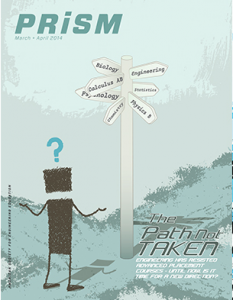H.S. Engineering Pilot Course
When it comes to STEM education, engineering often is the “silent partner.”
High schools, for example, offer Advanced Placement courses in Physics, Biology, Chemistry, Calculus, and Computer Science. Yet engineering, if it even exists, typically falls into the extracurricular realm.
That’s about to change. For the past five years, an influential group of engineering deans led by the University of Maryland’s Darryll Pines has been laying the groundwork to develop a nationally recognized high-school engineering course – with more than 100 of them recently pledging to consider awarding college credit. Their effort just received a major boost from the National Science Foundation: A three-year, $4 million grant for a pilot program to create and test the effectiveness of a pre-college course on engineering principles and design.
“A standardized high school engineering course will help remove the mystery and democratize the learning and practice of engineering,”explained Dawn Tilbury, NSF’s assistant director for engineering, who calls access to undergraduate engineering education a key part of building America’s future STEM workforce.
The pilot program, entitled Engineering For US All (E4USA), is being led by the University of Maryland in partnership with Arizona State University, Morgan State University, and Virginia Tech, with Vanderbilt University evaluating the curriculum, student learning, and teacher training. Some 1,400 students in 40 high schools nationwide are expected to participate in testing the dual-credit course.
The curriculum, which will include an engineering design project and align with the Next Generation Science Standards, is being developed in collaboration with the American Society for Engineering Education (ASEE), the College Board, Project Lead the Way, and NASA Goddard.
The pilot partners also will create and deploy a national professional development program that prepares teachers to teach the curriculum effectively and assess student design projects based on uniform standards. A web-based tool will help researchers track and evaluate the learning and practice of engineering concepts by teachers and students.
The pilot program grows out of a long-term effort, detailed in a March 2014 cover story in ASEE’s Prism magazine, to create an Advanced Placement Engineering course.
“The skills learned in engineering classrooms enable students from demographically and geographically diverse schools to not only become better prepared for the academic challenges within science, technology, engineering, and math (STEM) courses, but to become better prepared for life,” said principal investigator Pines, dean of the University of Maryland’s A. James Clark School of Engineering.
Filed under: Grades 9-12, K-12 Education News
Tags: Advanced Placement, American Society for Engineering Education Prism magazine, Curriculum, design thinking, Education Policy, Engineering, Engineering Design, Grades 9-12, high school engineering course, National Science Foundation, Professional Development, STEM education, University of Maryland A. James Clark School of Engineering








